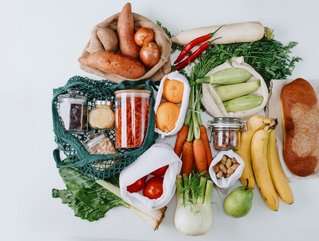Supermarket eco-labels to boost sustainability transparency

In 2021 UK supermarkets M&S, Co-op and Sainsbury’s partnered with Spanish supermarket Eroski to support the launch of a new eco-labelling system, Foundation Earth. The system aims to make consumers aware of how their chosen food products impact the environment, whether that’s through carbon emissions, water usage, or biodiversity loss.
Until now food manufacturers have only been required to list their products’ main ingredients by percentage. However, with environmental awareness and a new generation of eco-conscious consumers on the rise, it’s becoming more important that shoppers have the option to measure how their supermarket shop is impacting the planet.
“As the end users in the food value chain, consumers’ needs, wants and ideas are integral at every step of the innovation process, and a closer relationship between consumers and the key actors in the food sector is essential if we are to create a food system which is better for both our health and the planet,” said Saskia Nuijten, Director of Public Engagement and Communication at EIT Food.
Improving transparency and traceability in the food system
An eco-labelling system has a key role to play in improving visibility in the food supply chain. The development of transparency and traceability along the food supply chain is an important stage of EIT Food’s five steps to accelerate the shift towards a completely sustainable food system.
There are currently 147 different labelling systems in place across Europe, causing confusion for customers and producers alike. EIT Food has therefore partnered with Foundation Earth to improve the development of a single, simple, and systematised environmental label that will allow consumers to compare products and make informed, environmentally-friendly choices.
“This pan-European scientific project will help us to further develop the concept of communicating the environmental impact of our food and beverage products. Foundation Earth will provide us with the opportunity to test environmental footprint methods, learn how different products perform and establish how consumers respond. We hope this could help inform discussions in Europe with regards to a universal system for environmental scores,” said Johannes Weber, Nestlé’s European Affairs Manager.
Driving ESG & net zero goals in the food supply chain
The project began with research undertaken at the UK’s University of Oxford, which studied the environmental impact of 57,000 food products. Based on a range of estimations, including land use, greenhouse gas emissions, and water stress, the research team created an ‘environmental impact score’ for every 100g of a product.
Results showed that fruits, vegetables, cereals and grains have a low environmental impact, whereas fish, cheese and meat score quite highly. This was phase one of the project.
Supermarket partner IGD has also contributed to the design of eco-labels, with the intention of creating a standardised European approach to the scoring system.
“We recognise there is a growing appetite from all parts of the food system to measure and communicate the environmental impact of individual products, to drive positive change in consumption habits,” said Susan Barratt, CEO at IGD.
“We also know there is a real desire for collaboration, to champion a science-based approach to environmental labelling supported by robust consumer insights. We have been working in close partnership with senior industry representatives, NGOs and technical experts over the last few months to develop an environmental labelling framework. Seeing this workstream now move into the trial phase is an exciting next step,” Barratt added.
Having passed the first two stages (research and design), the Foundation Earth trial is now onto phase three: virtual store trials. This final phase aims to show the positive impact that eco-labelling will have on the food industry, by making food producers dedicated to achieving a better eco-score, as well as promoting more sustainable buying choices from consumers.
Barratt concluded: “Environmental labelling is a very complex area, so the fact we are taking a coordinated approach to drive consensus across the whole sector, with support from leading food companies, is an incredibly important step forward.






